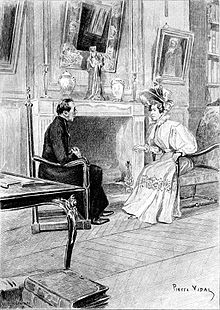Le Curé de Tours

Image from Le Curé de Tours
|
|
| Author | Honoré de Balzac |
|---|---|
| Illustrator | Pierre Vidal |
| Country | France |
| Language | French |
| Series | La Comédie humaine |
| Publisher | Mame-Delaunay |
|
Publication date
|
1832 |
| Preceded by | Pierrette |
| Followed by | La Rabouilleuse |
Le Curé de Tours is a long short story (or, more properly, a novella) by Honoré de Balzac, written in 1832. Originally entitled Les Célibataires (The Celibates), it was published in that year in volume III of the 2nd edition of Scènes de la vie privée, then republished in 1833 and again in 1839, still with the same title but as one of the Scènes de la vie de province. Not until 1843 did it take on its present title of Le Curé de Tours when it appeared in volume II of Scènes de la vie de province (volume VI of his vast narrative series La Comédie humaine).
Le Curé de Tours is one of the best known of all Balzac’s fictions.
The action of the novella takes place in or near Tours, with a brief excursion to Paris, in the year 1826.
The Abbé François Birotteau and the Abbé Hyacinthe Troubert, both of whom are priests at Tours, have separate lodgings in the house belonging to the crabby spinster Sophie Gamard in that city. Birotteau is an other-worldly, gentle, introspective type; Troubert, who is ten years younger than his fellow boarder, is very much of the world: he is a careerist devoured by ambition.
Birotteau prides himself on his furniture and fine library, inherited from his friend and predecessor as parish priest of Saint-Gatien de Tours. Without reading all its clauses, or at least without remembering them, he signs a document handed to him by Mlle Gamard, forfeiting his entitlement to his lodgings and making over their contents to her in the event of his vacating his premises for any considerable period. He leaves them for a fortnight’s stay in the country, where he is served with a possession order by his landlady’s lawyer. On returning home he finds Troubert installed in his apartments, in full possession of his furniture and his library, whilst he himself has been moved into inferior rooms.
Birotteau abandons any prospect of a lawsuit to regain his property, as his friends in the provincial aristocracy of Tours gradually withdraw their backing. In return for giving up his rooms he had expected to be appointed to the vacant canonry of the cathedral. Instead, he is demoted to a much poorer parish two or three miles out of Tours. Deprived of his library and furniture, he leaves Mlle Gamard’s, thinking that this will indirectly bring him, through Troubert, the canonry which never comes. Troubert, on the other hand, is first appointed Vicar-General of the diocese of Tours, then Bishop of Troyes, scarcely deigning to look in Birotteau’s direction as he speeds past his colleague’s dilapidated presbytery on his way to his diocese.
...
Wikipedia
